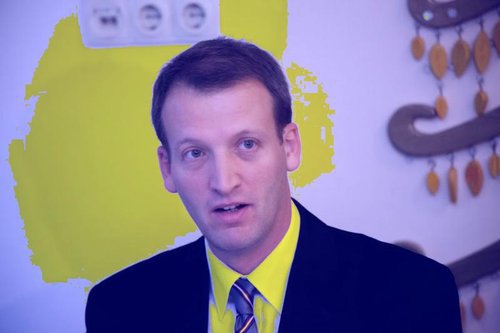In celebration of the 175th Anniversary of the Scottish Mission in Budapest, the RCH talks with Rev Zoltán Tarr, former Associate Minister at the Mission, to hear about his time in the congregation. Rev Tarr was the Associate Minister at the Mission from 2001 until 2005, a time when helping those seeking refugee was in delicate balance with also serving the ex-pat population in the city.
In celebration of the 175th Anniversary of the Scottish Mission in Budapest, the RCH is interviewing various ministers, past and present, to hear the stories about their service at the mission. Today, we talk with Rev Zoltán Tarr, former Associate Minister at the Mission from 2001 to 2005, to discuss the fundamentals of the Scottish Mission, the balance of reaching out to refugees and ex-pats alike, and also how the Mission stayed true to its God-given calling in the world.

In light of the jubilee’s Biblical motto, Galatians 5:6, “The only thing that counts is faith expressing itself through love,” and its overarching theme of “Outreach of Love,” how do you see the essence of the Scottish Mission in Budapest?
I really like this motto, because it summarizes for me the service and the fundamentals of the Scottish Mission. The Scottish Mission was and is about accepting, integrating and sharing. The Scottish Mission is a truly international community, where one can experience the colorful and rich reality of humanity and God's miraculous love forming it into a community. I have always enjoyed the mixture of rich reformed Christian tradition and new expressions of faith being present in the life of the Scottish Mission. The community was always strong in and dedicated to service and outreach. The Scottish Mission was never only about enjoying ourselves in the community as it is, but was clear about having a zeal – a reason to be present in Budapest, Hungary.
What would you characterize as being the main focus of the Mission during your time there?
In my period, serving with Ken, it was important for us to gather new members for the congregation by looking for people and families among the expats working and living in Hungary. It was also a time to take care of the establishment and advancement of the congregation's physical environment, including the Church and the manse.
With its long history of reaching out to “the other” and those on the fringes of society, how did you experience the Scottish Mission providing refuge to people during your service there?
When I was serving it was the time Hungary started to face the issue of (illegal) migrants, mostly from war-torn areas of the world. As the Church in Hungary slowly started to reach out to these people the Scottish Mission was an obvious partner to involve, as the Scottish Mission was from the very beginning open to migrants. While it was not without difficulties, the support for migrants was never questioned by the congregation. However, it was very clear that maintaining a fragile balance between taking care and going after the expats, and being open for those seeking refuge is very important in being faithful to our calling.
Given that St. Columba’s is in a unique position, simultaneously being a part of both the Church of Scotland as well as the Reformed Church in Hungary, how did you view the connection between the Scottish Mission and the RCH during your time in Budapest? Did you see your congregation influencing the Hungarian church?
It was on purpose that for many years the Hungarian minister was coming from or was closely linked to the Synod of the Reformed Church in Hungary. This way there was a direct contact between the Scottish Mission, and the Church of Scotland, and RCH. I did see ways the congregation could influence the Hungarian church, but it was, and I think still is, a sensitive effect, which mostly came through the people who attended the church. There were no established ways of exchange between the Hungarian church and the Scottish Mission, but as a community, living out its calling, the Scottish Mission could be a visible and clear sounding ambassador.
How does your time serving at St. Columba’s affect your work today?
It is a time I will always remember. The openness and the dedication to service of the Scottish Mission taught me to always search for the relevance of God's mission today and also to search for ways to share the love of God.
Interview by Kearstin Bailey